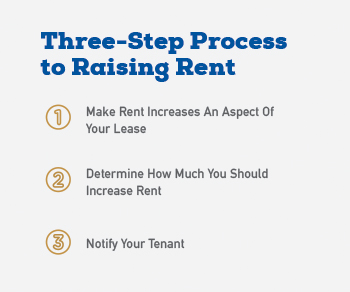A common fear for all landlords is rocking the boat with a loyal tenant by asking for a rent increase when it comes time to renew the lease. But with new expenses every year and property tax increases, your investment returns can quickly begin to diminish. So the question remains, how do you successfully raise your rent and renew a lease with a current tenant?
There are many reasons why you as a landlord would want to renew a lease with your renter. Maybe you have an incredibly reliable tenant that pays rent on time and is respectful to you as their landlord and the renters around them. You could have built a relationship with this person where you are able to work well within the landlord-renter dynamic. They understand the rules that you have created as a landlord and you rarely, if ever, have any complaints or issues to deal with.
Or you don’t want to go through the painstaking process of cleaning and fixing up a unit to put it back on the market and wait for a new renter to come along. There is no guarantee if you have to flip your unit and find a new tenant that they’ll be as great as the last tenant. Even worse, renovations and repairs tend to take longer and cost more than planned, which can leave you with an extended vacancy.
If these reasons apply to you, then renewing your current lease is likely the best option available.
Before you send over the renewal with an increased rate for rent, it is important to weigh the costs and benefits of raising the rent knowing this could lead to your tenant not renewing.
Factors such as market values in your area, vacancy rates, and whether your tenant can pay more in rent all play into whether you should ask for more rent from your current renter.
To keep the process of renewing a lease and raising the rent simple and easy to follow, here is a three-step process:
 Before you consider raising the rent during a lease renewal, know your local laws. Both state and local laws vary in terms of raising rent. Some areas have rent control laws that prohibit it. Others have rental caps that stop landlords from raising it past a certain percentage or dollar amount.
Before you consider raising the rent during a lease renewal, know your local laws. Both state and local laws vary in terms of raising rent. Some areas have rent control laws that prohibit it. Others have rental caps that stop landlords from raising it past a certain percentage or dollar amount.
If you can raise the rent on your apartment during a lease renewal, then you need to weigh the pros and cons of asking your tenant for more money each month. As previously mentioned, a reasonable fear is pushing a tenant out after proposing a rent increase, then having to spend more money to try to find another renter for the unit.
Also consider vacancy rates. Do you see many units like yours left empty in surrounding properties? Have you had issues with finding new renters in other units? Or is your rental in a popular area with constant demand? Knowing how difficult it will be to rent your unit if your current tenant doesn’t want to pay more in rent will help you determine if it’s worth it to raise the rent.
Step One: Make Rent Increases Part of Your Lease
If you live in a place where you can raise the rent, then your tenants are probably expecting that you will do so each year. Make this clear and avoid blindsiding your renters, include this in writing in the original lease.
The lease can include information about the increase, such as what percentage of the rent will be added each year or what the dollar amount will be. Also include any information regarding when the tenant needs to give notice or if they are planning to renew the lease.
Step Two: Determine How Much You Should Increase Rent
Step two can be tricky. To figure out how much you should be asking for in a rent increase will depend on the market value of similar units in your area. Do some research and compile a list of the rent from some available units within your neighborhood. If the average rent for a one-bedroom apartment is $1,600, it wouldn’t be such a good idea to raise your rent to $1,900 for a similar unit. A normal rent increase would be anywhere between three to five percent of the current rent, but that depends on your situation and current rent as well.
Step Three: Notify Your Tenant
After you have decided how much you want to raise the rent to, it’s time to notify your renter. This should be done 45 to 60 days before the lease termination date.
Because a landlord’s best case scenario is to successfully raise the rent while maintaining a good relationship with a renter, you might want to have an idea of what you are willing to compromise on in order to keep your tenant happy and comfortable with the increase.
These compromises might include repainting the apartment, changing out older appliances, offering complimentary parking or other, low-cost concessions.
Once you have come to an agreement on how much the rent will increase, be sure to write a signed and dated “rent increase notice” to your tenant for your record keeping. This is good practice prior to renewing the lease.
Marin Scott is Content Associate at Avail. Avail is a platform that enables landlords to advertise rental units, screen tenants, request background, credit, and eviction checks, create and sign lease agreements, and collect rent — all online.























0 Comments